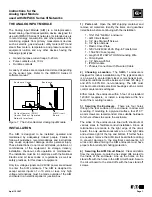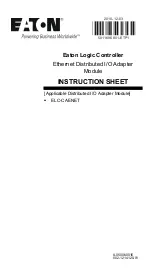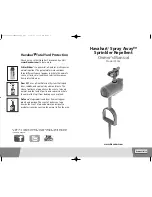
7.14.3 REHAU Pressure Test Procedure
- Use an air test if conditions do not permit a water test (e.g., freezing
conditions, insuf
fi
cient water supply/pressure).
- Air temperature will affect the gauge pressure. Perform all pressure
tests at a constant temperature. Verify maximum pressure require-
ments for other systems prior to performing the test.
- Conduct a visual inspection of the piping system, to ensure all
connections have been properly made and all piping has been
properly secured prior to pressurization.
- Perform a preliminary pressure test pressurizing the system to 1.5
times the maximum operating pressure not to exceed the maximum
pressures de
fi
ned above for 30 minutes.
- As the piping expands, restore pressure,
fi
rst at 10 minutes into the
test and again at 20 minutes.
- At the end of the 30-minute preliminary test, pressure must not fall
by more than 5 psi from the maximum, and there shall be no
leakage.
- After performing the preliminary test, perform the main pressure test
immediately. The main pressure test shall last at least 2 hours. The
test pressure should be restored and must not fall more than 3 psi
after 2 hours. No leakage should be detected.
- It is recommended to maintain pressure on the system during further
construction, where practical, to immediately identify any damage. If
a water (hydrostatic) test is used, protect the water from freezing or
drain water from pipes.
- If any repairs or corrections are necessary, depressurize the system
before proceeding.
NOTICE
-
When other thermoplastic piping materials (e.g., CPVC, PP-R) are
present in the piping system, these sections of piping must be
isolated from the REHAU PEXa piping system during the pressure
test. The installer must consult the other component manufacturer’s
installation instructions for pressure testing those sections of the
system.
-
Always refer to the local codes for pressure testing requirements and
use air testing only if approved by the local Authority Having
Jurisdiction (AHJ).
-
REHAU only provides the general guidelines for performing a
pressure test, which by no means supersede or are intended to
contradict safety requirements. It is the responsibility of the installing
contractor to ensure a proper and safe pressure test is performed on
site.
-
All other trades must be noti
fi
ed that the pressure test will be
conducted on the piping system.
7.15 Testing System Flow
The local Authority Having Jurisdiction (AHJ) may require a
fl
ow
veri
fi
cation test of the two most hydraulically remote sprinklers. This
fl
ow veri
fi
cation test is a valuable procedure to ensure the installed
fi
re sprinkler system is operating as designed. The local inspector
must be noti
fi
ed prior to performing the
fl
ow test to ensure the
inspector is present during the test.
The
fl
ow test must be performed after all piping,
fi
ttings, sprinklers
and plumbing connections have been completed and successful
pressure testing of the system has been done. The
fl
ow test must
occur prior to closing in the system.
The
fl
ow veri
fi
cation test consists of the following steps:
1. Remove the sprinklers.
Make sure the piping system is not under pressure and water
has been drained from the portion of piping serving the
sprinklers. Using the manufacturers' sprinkler wrench, carefully
remove the sprinklers intended for testing and secure in a safe
place in order to avoid any damage.
2. Install the appropriate test
fi
ttings.
Obtain proper test
fi
ttings that consist of a 1/2 in. MPT adapter
that will connect to the FIREPEX sprinkler
fi
tting, a
fl
ow control
valve, a pressure gauge, a sprinkler test ori
fi
ce and a 30-gallon
bucket. Thread male adapter into the sprinkler
fi
ttings. Use pipe
thread seal tape to make the threaded connections watertight.
3. Open the main shut-off valve.
Ensure all connections are made and all plumbing connections
are sealed. Open main shut-off valve to supply water to the
system.
4. Open the ball valve on the test
fi
ttings.
Open the valves and bleed all air from the system using the
containment buckets. Once all air is purged from the system,
close the valves. The system should be pressurized to its working
pressure.
5. Record the static pressure readings.
Note the static pressure at the manifold pressure gauge and at
the pressure gauge on the test apparatus.
6. Perform the
fl
ow veri
fi
cation test.
Simultaneously open the ball valves on the test apparatuses.
Ensure the buckets are properly placed under the apparatuses to
capture all water. The ball valves are to be open for exactly 60
seconds. During this time, record the residual pressure readings.
After 60 seconds, shut the ball valves immediately.
32



































